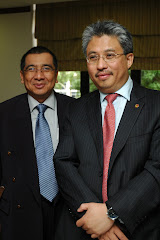BETTER ALTERNATIVE: In hindsight, Malaysia should have implemented GST earlier
SOME say the 2014 Budget is one that is in keeping with the 13th General Election promises made in May this year. Some had issue with the proposed goods and services tax (GST), saying it would lead to inflation, while others questioned the rationale of increasing the Real Property Gains Tax (RPGT).
As they say, "uneasy lies the head that wears the crown". Whatever you do, someone will find a reason or reasons to criticise it. It's like saying hell if you do and hell if you don't.
The pressure for the government to seek new sources of revenue is understandable. The nation has moved away from taxing trade towards taxing income. Taxing income is a tax on effort and work. Nations in the region have reduced their tax rates on income to attract investments and talents. The alternative is, naturally, to tax consumption, which constitutes a bigger share (50-60 per cent) of the aggregate demand. A broad-based consumption tax, such as GST, has an inherent advantage. If a resident consumes, he is taxed. If he does not and saves, the nation can tap the savings for development purposes.
Malaysia will do away with its sales tax at a rate of 10 per cent on introducing the GST at a rate of six per cent in 2015. This is a logical move. Sales tax is based on the price of goods, irrespective of value addition and is therefore arbitrary. With our practice on giving exemptions, the government will have to entertain lots of applications for exemption and this is inefficient. Furthermore, sales tax is levied at every level of transaction and therefore, has a cascading effect and will result in higher prices.
GST is levied on value addition, which is a smaller component of the product price. The tax, therefore, is a smaller component of the final price. It does not cascade with other transactions.
People may want to know whether GST will lead to a price increase. By itself, it will. If it does, then it will only be at the point of introduction and no more. If the price increase persists in the second year and thereafter, this is caused by reasons other than GST, such as unfair trade practices and market imperfections.
The net effect on price initially will be between the impact of introducing GST and the withdrawal of sales tax. If we have a fair trade enactment, such unfair trade practices can be addressed through such law.
The government will collect more revenue from GST because of its broad base, notwithstanding the exemptions or zero-rating on goods such as fresh food, rice, cooking oil, coffee and sugar, as well as public transport, education and health.
We do not put GST on exports to ensure our exports remain competitive. Others do not practice this either.
On looking back, we should have implemented this tax earlier. Previous administrations did not do it to avoid possible backlash on the party in power. To be fair, it did in some other countries. The Malaysian voting pattern in the last two general elections, which resulted in some erosion of control by the party in power, were not at all associated with the suggestion of new taxes. It is because of other reasons, politically motivated reasons. Thus, this move for GST is right. It is also timely to mount GST now as inflation is under control.
A slight increase in consumer prices arising from GST is tolerable. Malaysians have seen significant increases in prices before, such as oil price and food price hikes, rice to be exact, in 2008.
The action of the government to introduce GST is not peculiar. Others have done so earlier. Our neighbours, Thailand and Singapore, and even Cambodia, have GST. Of course, developed countries have implemented it much earlier, such as in the United Kingdom and Australia.
Mounting the tax with other measures, namely, to do away with sales tax which is arbitrary and inefficient, and reducing income tax by one and three per cent, as well as terminating the sugar subsidy, is a strategic move aimed at improving our fiscal system amidst a stubborn deficit situation and pressing demand to raise revenue to finance social development projects.
Hence, this particular budget and its proposals are a step in efforts to strengthen government finances in the long run while putting in place initiatives that send a serious message that rationalising subsidies may be another option in the years to come.
We hope the budget, after equally giving support for the low-income citizens (BRIM, for one), will be well received by the majority of the population.
The 2014 budget, on balance, is well conceived. It, however, needs its philosophy and objectives need to be explained to the public better to get a buy-in from our society.
Read more: Less taxing to tax consumption - Columnist - New Straits Times http://www.nst.com.my/opinion/columnist/less-taxing-to-tax-consumption-1.390524?localLinksEnabled=false#ixzz2jXlO4jqy
also:
GST to result in poor paying less sales tax:
KUALA LUMPUR: Malaysians need to understand that the Goods and Services Tax (GST) that is likely to be implemented in 2015 is a modified version, with the inclusion of a zero rate and exempt items, as well as a sales threshold, as found in most countries.
Former professor of Applied Economics and Dean of Faculty of Economics and Administration, Universiti of Malaya Tan Sri Dr Fong Chan Onn explained, the modified GST that is to be adopted by Malaysia will allow for some 40 basic food necessities to be listed as zero tax items, including rice, sugar, milk powder and flour, while essential services, such as healthcare, may be classified as tax-exempt.
"At a personal level, through the modified GST the public can decide for themselves whether to pay consumption taxes when dining out or avoid tax payments by preparing their own meals with essential items that are exempt from the GST," he told Bernama here.
The GST will replace the 16 per cent sales and services tax (SST) now levied on certain goods and services, such as food and beverages in restaurants and hotel services. Presently, much of the public does not realise that even those who are not required to pay income tax still pay sales taxes and service taxes on goods and services they consume through the SST.
This is because most consumers are not aware that the tax has been embedded in the price of goods and services sold by retailers.
That is why some economists point out that since most items are already being taxed under SST, the transition from SST to GST will ease the burden on the poor, as some items they purchase would become zero tax items.
In principle, GST is supposedly a regressive tax, since it is imposed on all goods and services produced in the country, including imports.
However, as explained by Deputy Head of the School of Business, Monash University of Malaysia Prof Jeyapalan Kasipillai, there are ways to mitigate the tax burden faced by middle and lower income groups, as well as small businesses.
"Essential supplies of over 40 items would be either zero-rated or exempted, and such a move would be favourable to the broader community, particularly the lower income groups," he wrote in an article published in a local newspaper on Oct 19. Zero-rated goods and services are those items that have no tax charged to consumers, which means the consumer will pay GST at the rate of zero per cent. He said based on the data compiled from the Household Expenditure survey (HES), which collates information on levels and trends of consumption expenditures by households on a wide range of goods and services, the finding suggest that GST can be fairly progressive.
Some analysts have predicted that the new tax is likely to start at four per cent, and may later rise to six per cent.
Malaysia is among the last ASEAN countries, together with Myanmar and Brunei, that has not implemented the GST. Indonesia introduced the GST in 1985, Thailand in 1992 and Singapore in 1994. Dr Fong also explained that GST, a broad-based consumption tax or value added tax, is part of the fiscal reforms undertaken by the government to reduce deficits and achieve a balanced budget by 2020. This would serve as more broad-based revenue collection system that will greatly expand the number of taxpayers as the fairest method of taxing the general public.
Currently, only 1.7 million of the country's 29 million citizens pay income tax. With GST in place, there is no doubt that there will be differences in how Malaysians spend. First, they will be calculating the tax, then evaluating it as to whether a purchase is worthwhile.
Then, if consumers do not feel the purchase is needed at the price asked, they will either seek a less expensive alternative or choose not to continue with the purchase. -- BERNAMA
Read more: 2014 Budget :GST to result in poor paying less sales tax: Expert - Latest - New Straits Times http://www.nst.com.my/latest/font-color-red-2014-budget-font-gst-to-result-in-poor-paying-less-sales-tax-expert-1.384803?cache=%2Fwp-content%2Fthemes%2Faggregate%2Ftimthumb.php%2Fwp-content%2Fthemes%2Fsportpress%2Ffunction%2Ftimthum.php%3Fpage%3D0%3Fpage%3D0%2F7.502513%2F7.502513%2F7.502513%2F7.541994#ixzz2jXlkyQ4C















































No comments:
Post a Comment